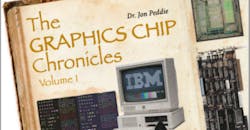The Graphics Chip Chronicles Vol 1 eBook
This article is part of the Series: The Graphics Chip Chronicles
Graphics processors have been an important part of computer systems almost since their inception, and they have steadily progressed from providing limited support for low-resolution displays to platforms that provide real-time ray-tracing support. Early display controllers provided features like bit blitting and sprites. Many of these features started out on PCs to support gaming and other applications. These technologies migrated into cell phones that turned into the smartphones of today, which are essentially supercomputers-in-a-pocket.
